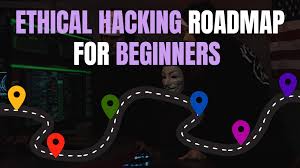Ethical Hacking RoadMap For Begineers
Starting a journey in ethical hacking can be an exciting and rewarding endeavor. To provide you with a roadmap, let's break it down into three stages:
Stage 1: Foundation and Fundamentals
Stage 2: Skill Development and Practical Experience
Stage 3: Advanced Specializations and Continuous Learning
Stage 1: Foundation and Fundamentals
1. Learn Networking Basics: Understand TCP/IP, DNS, HTTP, and other protocols. Familiarize yourself with network architecture, subnetting, and IP addressing.
2. Gain Operating System Knowledge: Study popular operating systems such as Windows, Linux, and macOS. Learn their file systems, user management, and security mechanisms.
3. Programming and Scripting Languages: Learn languages like Python, Bash, or PowerShell to automate tasks, build tools, and understand code vulnerabilities.
4. Study Cybersecurity Fundamentals: Understand common threats, attack vectors, and defensive measures. Topics to cover include cryptography, malware, social engineering, and web security.
5. Virtualization and Networking Tools: Get hands-on experience with tools like VirtualBox, VMware, or Docker for setting up virtual environments and practicing hacking techniques.
Stage 2: Skill Development and Practical Experience
1. Web Application Hacking: Dive into web application security, including topics such as SQL injection, cross-site scripting (XSS), and session management vulnerabilities. Practice using tools like Burp Suite, OWASP ZAP, and SQLMap.
2. Network Scanning and Enumeration: Learn how to discover open ports, services, and vulnerabilities on target systems using tools like Nmap and Nessus.
3. Exploitation Techniques: Understand common exploits and vulnerabilities. Study buffer overflows, remote code execution, privilege escalation, and post-exploitation techniques.
4. Wireless Network Security: Explore wireless network security concepts, such as Wi-Fi encryption, attacks on WPA/WPA2, and rogue access points. Gain experience with tools like Aircrack-ng and Wireshark.
5. Operating System Security: Focus on hardening and securing operating systems. Learn about system vulnerabilities, secure configurations, and intrusion detection systems.
Stage 3: Advanced Specializations and Continuous Learning
1. Choose a Specialization: Select an area of expertise based on your interests and career goals. Options include network security, application security, mobile security, cloud security, or IoT security.
2. Certifications: Pursue industry-recognized certifications such as Certified Ethical Hacker (CEH), Offensive Security Certified Professional (OSCP), or Certified Information Systems Security Professional (CISSP) to validate your skills.
3. Participate in Bug Bounty Programs: Engage in bug bounty platforms like HackerOne or Bugcrowd to find vulnerabilities in real-world applications and earn rewards.
4. Continuous Learning: Stay updated with the latest security trends, vulnerabilities, and hacking techniques. Join security communities, read security blogs, attend conferences, and participate in Capture the Flag (CTF) competitions.
5. Ethics and Legal Considerations: Always prioritize ethical hacking and adhere to legal boundaries. Understand the laws and regulations in your jurisdiction to ensure responsible and lawful hacking practices.
Remember, ethical hacking requires continuous learning and practice. Start with a strong foundation, gradually develop your skills, and remain curious and dedicated to your craft.



Comments
Post a Comment